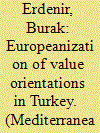| Srl | Item |
| 1 |
ID:
137609


|
|
|
|
|
| Summary/Abstract |
This essay analyzes the change in value orientations of Turkish society in recent decades with reference to the Europeanization process the country has been going through, particularly that embodied in the European Union accession process. As the Europeanization of Turkish political culture is closely related to the consolidation of democracy, the change in value orientations sustaining democracy would be an indicator showing the extent of societal Europeanization in Turkey. Based on the World Values Survey, changes in secular-rational and self-expression value orientations of Turkish society are examined vis-à-vis those dominant in European societies. Levels of religiosity, interpersonal trust, and social tolerance are selected for cross-cultural comparison. The essay elaborates on the reasons Turkish society has been diverging from European societies on value orientations at a time when the country has been experiencing a vast socioeconomic change, with millions of people moving into the middle class.
|
|
|
|
|
|
|
|
|
|
|
|
|
|
|
|
| 2 |
ID:
087005


|
|
|
|
|
| Publication |
2009.
|
| Summary/Abstract |
The monumental progress made by Turkey since the late 1990s towards the establishment of solid democratic institutions and politics can be counted as the greatest success story of the European Union's enlargement policy. Arguably, the EU has been an indispensable partner-not just an accessory-towards that progress. At the same time, a consolidated EU-Turkey relationship has much broader political implications than merely the strengthening of Turkish democracy. For a number of reasons, that consolidated relationship also has a strong impact on the evolution of the overall international order.
|
|
|
|
|
|
|
|
|
|
|
|
|
|
|
|
| 3 |
ID:
087376


|
|
|
|
|
| Publication |
2009.
|
| Summary/Abstract |
In a global trend toward democratization,
the Middle East has for many
years proved to be the exception.
Nevertheless, very recently this region
has started to come out of its stubborn
resistance to democratic change, resulting
in the ascendancy of political Islam. In the
dominant authoritarian order, religion tends
to provide the Islamist parties a sort of
protection from the repression of political
regimes. This structural advantage has put
the Islamists in a better position to capitalize
on the recent changes in the region, giving
them the opportunity to emerge as winners
in many recent free elections throughout
the region. This is hardly surprising, since
a heavy legacy of authoritarianism, a lack
of democracy, and the oppression of secular
political forces would surely make this
outcome almost inevitable for any election in
this region. Thus, after the 1992 experience
in Algeria, where authorities canceled a general
election dominated by radical Islamists
and precipitated a bloody civil war, several
Islamist parties have managed to come to
power in the Middle East. This has been the
case in Turkey since 2002, Iraq since 2005
and in the victory of Hamas in the Palestinian
election of 2006. An Islamist party coming
to power in democratic elections is a new
phenomenon that is likely to be replicated.
|
|
|
|
|
|
|
|
|
|
|
|
|
|
|
|